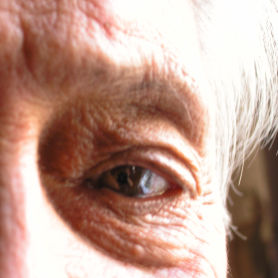Eyes macular degeneration
Over 25 percent of Americans over 65 have macular degeneration. It can lead to blindness and affects more Americans than glaucoma and cataracts combined. And, as you grow older, your risk increases dramatically.
Fortunately, there’s plenty you can do to prevent it from happening to you. Today you’ll read about a few simple steps you can take to avoid it.
Age-related macular degeneration occurs when the macula, an area at the back of the retina, begins to break down.
Two new studies show that age-related macular degeneration can be prevented through a diet containing the right amount of a few simple nutrients.
Researchers at the Archives of Ophthalmology evaluated 4,519 people aged 60 to 80 between 1992 and 1998 who took part in a trial sponsored by the National Institutes of Health’s National Eye Institute.1
First, they checked patients for signs of macular degeneration. If they had it, the researchers looked at how far it had progressed.
Patients also completed a food questionnaire to find out how much of certain vitamins, minerals and other essential nutrients such as fatty acids they were getting.
Of the total, 1,115 patients had no symptoms of disease at the outset, while 658 people had a severe form of the disease.
When their diets were evaluated, the researchers found that people who ate more fish — more than two medium servings per week or more than one serving of broiled or baked fish — were least likely to have the disease.
A second team of researchers analyzed data from 7,752 people taking part in a large national study between 1988 and 1994.
Eleven percent of the patients had AMD.
The researchers found that vitamin D was associated with reduced risk of early AMD, but not advanced AMD.
When participants were split into five groups based on level of vitamin D in the blood, those in the highest group had a 40 percent lower risk of early AMD than those in the lowest group.
They suggested vitamin D may cut the risk of early age-related macular degeneration by reducing inflammation or preventing blood vessel growth in the retina.
While these new studies are helpful, they don’t tell the whole story. There are a number of other essential nutrients that can also prevent macular degeneration and improve your eyesight.
• Lutein and Zeaxanthin: These carotenoids go hand in hand to prevent and treat AMD. They are the most potent combination of carotenoids we know of. They’re naturally present in the retina, and highly concentrated in the macula.
• Vitamin E: Look for it as “mixed tocopherols.” This is a vital vision protector.
People with higher concentrations of these two carotenoids in the retina tend not to develop AMD. They increase the density of macular pigment.
The higher the density, the more protection your eyes have.
My Wellness Research team’s also just completed a special formula designed to protect and preserve your vision for years to come. It’s called NutraVision.
It contains vitamins A, C, D, and E as mixed tocopherols, along with the most important carotenoids in full anti-oxidant doses, trace elements like zinc and copper, lycopene and herbals such as gingko biloba and vinpocetine from the periwinkle plant. These are your eyes’ best natural allies.
learn more in our section here detailing all the essentials of Eye Problems and Defective vision.
the A to Z directory of dealing with Health Problems & Self Care Strategies for natural remedies to your health issues.

Subscribe to get your weekly "Health Success Magazine" with a new complete & comprehensive Health Report in every edition!

to “Your Health Success”
our weekly F’R’E’E’ Newsletter
If you would like a free no-obligation private consultation or to contact Warren Tattersall for more information, please click here >> Contact Us

Click the books above to learn more about how we treat CFS naturally, to get your life back!
You will find many assorted Health Reports available for download free to you on this website!
Our free Health Success Reports are each available for you to download when you subscribe to receive them and their 7 part eCourse.
You can unsubscribe at any time, but we are sure you will want to receive all the email lessons of these informative ecourses.
Read more HERE to select the REPORT subjects of most interest (or concern) to you.









